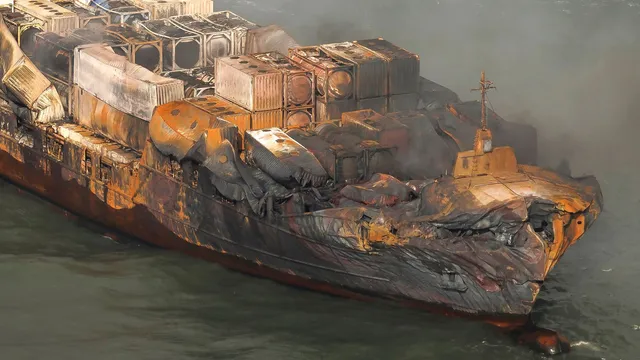
Captain charged after cargo ship crash leaves crew member presumed dead
2025-03-28 11:48- The cargo ship Solong collided with the U.S. tanker Stena Immaculate on March 10, 2025.
- A crew member is missing and presumed dead, while the ship suffered damage leading to pollution concerns from released nurdles.
- Vladimir Motin, the captain of the Solong, has been charged with gross negligence manslaughter.
Express your sentiment!
Insights
In the North Sea, a significant maritime incident occurred on March 10, 2025, involving the cargo ship Solong and the U.S. oil tanker Stena Immaculate. The crash happened about 12 miles off the coast of East Yorkshire, causing an explosion and resulting in one crew member, 38-year-old Filipino national Mark Angelo Pernia, going missing and presumed dead. The impact ruptured containers on the Solong, leading to thousands of tiny plastic pellets, known as nurdles, washing up along the beaches of Norfolk. Authorities began efforts to clean up the nurdles to mitigate environmental harm. The owners of the Solong, a Portuguese-flagged vessel, confirmed that while no large-scale loss of nurdles was reported, some had been released due to subsequent fires on board. The British Coastguard coordinated the response and salvage operations, ensuring that the Solong was towed safely to the Port of Aberdeen for a thorough damage assessment. The salvage teams arrived with various vessels, including those equipped for counter-pollution efforts. Chief Coastguard Paddy O'Callaghan reported that salvage operations had progressed well and that the Stena Immaculate was in stable condition during ongoing salvage efforts. Notably, 36 crew members were rescued from both ships, highlighting the successful response to the crisis. Legal ramifications followed quickly after the incident, as Vladimir Motin, the Russian captain of the Solong, has been charged with gross negligence manslaughter. He is set to appear in court on April 14, 2025, facing serious accusations in relation to the tragic outcome of the crash. The case has raised questions about maritime safety and the responsibilities of ship captains, especially following a serious incident involving fuel and crew safety. Environmental concerns were pronounced, as nurdles, identified as potential threats to wildlife if ingested, began to populate multiple beaches. Local councils and conservation groups mobilized teams to clear the debris, assuring that action was taken before the breeding season commenced for local shorebirds. Authorities across Norfolk and Lincolnshire engaged in cleanup operations to protect the area’s ecological integrity. The unfortunate circumstances surrounding the Solong and the Stena Immaculate crash reflect the precarious nature of maritime transportation and the broad consequences that such incidents can have on human life and the environment.
Contexts
Nurdles, small plastic pellets used as raw material in the manufacture of plastic products, have emerged as a significant environmental concern, particularly regarding their impact on marine wildlife. These microplastics are often spilled during production and transportation, making their way into oceans and waterways. Once in the marine environment, nurdles can be ingested by a wide range of marine organisms, from small fish and invertebrates to larger marine species like seabirds and marine mammals. The ingestion of these pellets can lead to physical and chemical harm, as they can cause blockages in the digestive systems of these animals, leading to malnutrition or starvation. Moreover, nurdles often absorb toxic pollutants from the surrounding water, which can accumulate in the tissues of marine creatures and subsequently enter the food chain, causing potentially harmful effects on ecosystems and human health alike. Research indicates that nurdles can act as vectors for the transportation of harmful contaminants, exacerbating the problem of marine pollution. For instance, persistent organic pollutants (POPs) like pesticides, PCBs, and heavy metals can attach themselves to nurdles in the ocean. When these contaminated pellets are ingested by marine animals, they can introduce these harmful substances into the wildlife's metabolism, leading to detrimental health effects, reproductive issues, and even mortality. Furthermore, the small size of nurdles makes them difficult to clean up once they enter the marine environment, posing a long-term challenge for marine conservation efforts. The impact of nurdles on marine species extends beyond individual health issues; they can also disrupt entire marine ecosystems. Species that are pivotal to the marine food web may experience population declines as a result of the effects of nurdle ingestion. As smaller fish and marine organisms suffer from the consequences of nurdle consumption, the larger predators that rely on them for food may also be affected, leading to broader ecological imbalances. This chain of impacts underscores the importance of addressing nurdle pollution not only for the health of marine wildlife but also for the sustainability of marine ecosystems and the economy that relies on healthy ocean resources. Efforts to mitigate the impact of nurdles are ongoing, with various stakeholders, including governments, non-profit organizations, and the plastics industry, working together to implement solutions. Initiatives such as increased regulations on plastic production, improved transportation practices, and public awareness campaigns are crucial to prevent nurdle spills. Furthermore, enhancing recycling processes and developing biodegradable alternatives could reduce the reliance on plastic and its associated environmental risks. Effective collaboration among these stakeholders is essential to address this pressing marine environmental challenge, ultimately protecting marine wildlife and promoting the health of our oceans.